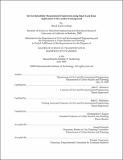Service reliability measurement framework using smart card data : application to the London Underground
Author(s)
Uniman, David Louis
DownloadFull printable version (2.783Mb)
Other Contributors
Massachusetts Institute of Technology. Dept. of Urban Studies and Planning.
Advisor
John P. Attanucci and Rabi G. Mishalani.
Terms of use
Metadata
Show full item recordAbstract
Service reliability is an important dimension of performance to transit passengers, affecting not only their perceptions of service quality, but their travel behaviour as well. The ability of transit operators to understand and improve reliability relies on their ability to measure it. Until recently, efforts to quantify this attribute of service from the perspective of passengers were limited by the small sample sizes obtained from manual surveys, or the use of supply-side data to indirectly capture the passenger experience. With the emergence of data from automated fare media, it becomes possible under certain conditions to directly observe travel times experienced by passengers and obtain improved estimates of the reliability of transit service. A framework is developed to estimate service reliability on heavy rail transit systems with both entry and exit fare control using data from Automated Fare Collection systems. A methodology is proposed as part of the framework to classify performance into incident-related and recurrent conditions in order to both gain new insight into the contribution of the different causes of unreliability as well as develop more robust measures of service reliability. The classification methodology is validated against incident log data corresponding to three origin-destination (O-D) pairs on the London Underground. Subsequently, the proposed framework is used to characterize the reliability of 800 Underground O-D pairs representing the highest-volume journeys on the system. Furthermore, models are estimated to quantify the effects of journey length, interchanges, and incident-related disruptions on reliability. (cont.) Two practical applications of the framework are also developed for the Underground. First, an extension of the existing service quality measurement system is proposed in order to quantify reliability as part of routine performance monitoring efforts. An application of this extension to the Victoria line during the morning peak reveals that reliability is an important part of service quality, with a contribution to total perceived travel times comparable to that of various average travel time components. Second, a way to provide passengers with reliability information through Transport for London's trip planning software is presented, in order to mitigate the negative impact of uncertain journey times. The potential benefits from the provision of this additional information are found to be appreciable relative to the current ability of the trip planning software to reduce uncertainty for Underground passengers.
Description
Thesis (S.M. in Transportation)--Massachusetts Institute of Technology, Dept. of Civil and Environmental Engineering; and, (M.C.P.)--Massachusetts Institute of Technology, Dept. of Urban Studies and Planning, 2009. This electronic version was submitted by the student author. The certified thesis is available in the Institute Archives and Special Collections. Cataloged from student-submitted PDF version of thesis. Includes bibliographical references (p. 162-165).
Date issued
2009Department
Massachusetts Institute of Technology. Department of Civil and Environmental Engineering; Massachusetts Institute of Technology. Department of Urban Studies and PlanningPublisher
Massachusetts Institute of Technology
Keywords
Civil and Environmental Engineering., Urban Studies and Planning.